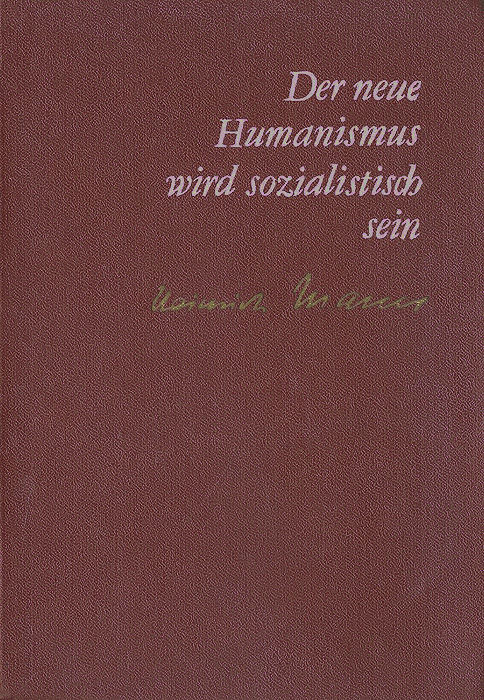Книга: Heinrich Mann «Der neue Humanismus wird sozialistisch sein»

|
В сборник входят главы из всемирно известных сатирических романов писателя "Учитель Гнус", "Верноподданный", исторической дилогии о Генрихе IV, а также лирические стихотворения, новеллы, антифашистская публицистика, в которой раскрываются высокие общественные идеалы Генриха Манна, эссе, статьи о Советском Союзе и избранные письма. Издание иллюстрировано, сопровождается вступительной статьей и комментарием к тексту. Оно предназначается, для студентов гуманитарных вузов, изучающих немецкий язык и немецкую литературу, а также для широкого круга читающих на немецком языке. Издательство: "Прогресс" (1977) Формат: 60x84/16, 368 стр.
Купить за 260 руб на Озоне |
Другие книги автора:
| Книга | Описание | Год | Цена | Тип книги |
|---|---|---|---|---|
| Ein ernstes Leben | — Fischer, - Подробнее... | бумажная книга | ||
| Meistererzahlungen | »Manchmal das Beste« nennt Heinrich Mann in einer Notiz an den Mail&# 228;nder Verleger Mondadori seine Erz&# 228;hlungen. Sein schriftstellerisches Leben lang haben die Novellen Heinrich Manns… — Fischer, - Подробнее... | бумажная книга | ||
| Ein ernstes Leben | "Heinrich Mann kennt seine Figuren in der banalsten Regung und fuhrt sie bis zum Aussersten ihrer Existenz. Er schildert den atavistisch kindischen Formelkram automatisierter intimer… — Fischer Taschenbuch Verlag; S. Fischer Verlag, Подробнее... | бумажная книга | ||
| Professor Unrat | Вашему вниманию предлагается роман "Учитель Унрат" Генриха Манна на немецком языке — Издательство иностранной литературы, (формат: 84x108/32, 248 стр.) Библиотека иностранной литературы Подробнее... | бумажная книга | ||
| Meistererzahlungen | Manchmal das Beste nennt Heinrich Mann in einer Notiz an den Mail&228;nder Verleger Mondadori seine Erz&228;hlungen. Sein schriftstellerisches Leben lang haben die Novellen Heinrich Manns… — Fischer, Подробнее... | бумажная книга | ||
| Ein ernstes Leben | ISBN:978-3-596-25932-8 — Fischer, Подробнее... | бумажная книга |
Heinrich Mann
Luiz (Ludwig) Heinrich Mann (
Life and work
Born in
His essay on Zola and the novel "Der Untertan" earned him much respect during the
Together with
Mann became "persona non grata" in Nazi Germany and left even before the
During the 1930s and later in American exile, his literary career went downhill, and eventually he died in
His second wife Nelly Mann (1890-1944) committed suicide in Los Angeles. She was 27 years younger than him.
Bibliography
"Incomplete"
*"In einer Familie". 1894.
*"Im Schlaraffenland". 1900.
** "In the Land of Cockaigne". Transl. from the German by Axton D. B. Clark. New York: Macaulay, 1929.
*"Die Jagd nach Liebe". 1903.
*"Professor Unrat". 1905.
** "The blue angel". Reprint of the 1932 ed. published by Jarrolds, London. Includes facsimile reprint of the original title page. New York: H. Fertig, 1976.
*"
*"Das Kaiserreich" ("The Empire"). 1918 – 1925
*"Die kleine Stadt". 1909.
*"Die Jugend des Königs Henri Quatre". 1935.
*"Die Vollendung des Königs Henri Quatre". 1938.
*"
* "Briefwechsel mit
ee also
* Walter Fähnders/Walter Delabar: "Heinrich Mann (1871 - 1950)". Berlin 2005 (Memoria 4)
*
Persondata
NAME = Mann, Heinrich
ALTERNATIVE NAMES = Mann, Luiz Heinrich
SHORT DESCRIPTION = German poet
DATE OF BIRTH =
PLACE OF BIRTH =
DATE OF DEATH =
PLACE OF DEATH = Santa Monica, California, United States
Источник: Heinrich Mann
См. также в других словарях:
Demokratischer Sozialismus — Der Demokratische Sozialismus ist eine politische Zielvorstellung, die Demokratie und Sozialismus als untrennbare Einheit betrachtet oder vereinen will. Sie wurde in der Sozialdemokratie seit der russischen Oktoberrevolution 1917 entwickelt, um… … Deutsch Wikipedia
Neoverismus — Der Italienische Neorealismus bezeichnet eine bedeutende Epoche der Filmgeschichte und der Literatur von 1943 bis etwa 1954. Der Neorealismus, auch Neorealismo oder Neoverismo genannt, entstand noch während der Zeit des italienischen Faschismus… … Deutsch Wikipedia
Italienischer Neorealismus — Der Italienische Neorealismus bezeichnet eine bedeutende Epoche der Filmgeschichte und der Literatur von 1943 bis etwa 1954. Der Neorealismus, auch Neorealismo oder Neoverismo genannt, entstand noch während der Zeit des italienischen Faschismus… … Deutsch Wikipedia
Communismus — Hammer und Sichel, meistverwendete Symbolik für Kommunismus Kommunismus (vom lateinischen communis = „gemeinsam“) bezeichnet das politische Ziel einer klassenlosen Gesellschaft, in der das Privateigentum an Produktionsmitteln aufgehoben ist und… … Deutsch Wikipedia
Kommunist — Hammer und Sichel, meistverwendete Symbolik für Kommunismus Kommunismus (vom lateinischen communis = „gemeinsam“) bezeichnet das politische Ziel einer klassenlosen Gesellschaft, in der das Privateigentum an Produktionsmitteln aufgehoben ist und… … Deutsch Wikipedia
Kommunisten — Hammer und Sichel, meistverwendete Symbolik für Kommunismus Kommunismus (vom lateinischen communis = „gemeinsam“) bezeichnet das politische Ziel einer klassenlosen Gesellschaft, in der das Privateigentum an Produktionsmitteln aufgehoben ist und… … Deutsch Wikipedia
